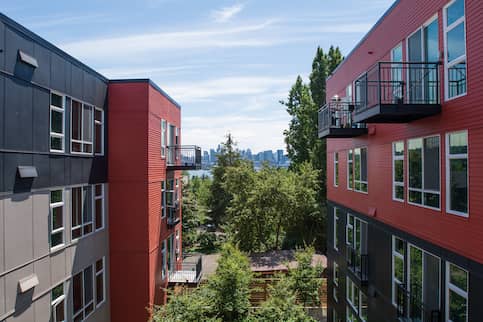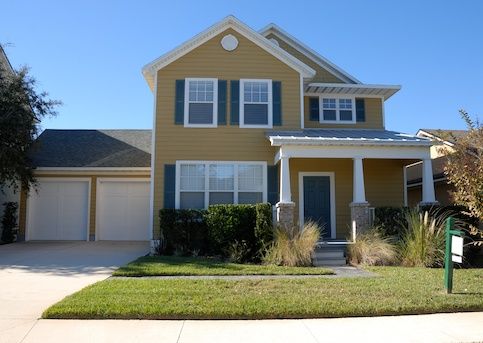After months of house hunting, you’ve finally found a beautiful home that’s right for you. No doubt, you’re thrilled at the prospect of moving into your new place. But there’s still the question of what to do with your current property.
Many homeowners find themselves in a similar situation, leading them to wonder, “Should I sell or rent my house?”
This will depend on your unique financial situation. In this homeowner’s guide, we will discuss useful information that can help you decide whether to sell or rent your home.
Reasons To Rent Your House Out Instead Of Selling
There are several reasons homeowners may choose to rent their current home rather than selling it.
Having a rental property can help you:
- Continue to build equity in your old home with rental income
- Diversify your assets
- Maintain positive cash flow
- Build wealth with extra income
- Qualify you for additional tax deductions
See What You Qualify For
Buy A Home
Discover mortgage options that fit your unique financial needs.

Refinance
Refinance your mortgage to have more money for what matters.
Tap Into Equity
Use your home’s equity and unlock cash to achieve your goals.
Reasons To Sell Your Home Instead Of Renting It Out
From avoiding a capital gains tax to saving on maintenance costs, selling your home instead of renting it out could be advantageous.
You might also decide to sell instead of rent in order to:
- Gain assets for a down payment
- Avoid the responsibilities of being a property owner
- Turn your property into liquid assets
- Take advantage of a seller’s market and get more for your house
Find top-rated kitchen remodelers.
Compare multiple quotes from local pros with HomeAdvisor.
9 Questions To Ask Before Selling Or Renting Your Home
Still not sure whether you should rent or sell? You should always consult with a real estate agent or professional before making any kind of decision. But to get started, these are nine key questions that you can ask yourself to help you make an informed decision.
1. How Much Equity Do You Have In Your Home?
It’s also important to determine if you need the equity from your current home or not. Home equity is the difference between what your home is worth and what you owe on your mortgage. If you have built up enough equity in your current home, selling it could be a good choice. The profit you make can be used for a large down payment on your next home or you can set aside for other purposes.
However, if you haven’t built up a lot of equity or don’t need to access it, renting out your home and collecting the long term income may make more sense.
2. Is The Neighborhood Rental- Or Owner Friendly?
When deciding whether to rent or sell your house, it may help to consider the qualities of your home and neighborhood. Maybe there’s a strong rental market in your area, or perhaps you live in a location that’s close to a local university or company. This may attract renters who are relocating to the area for school or work and help guarantee a good pool of candidates in the long term.
Alternatively, if your home is in an area where the majority of residents are homeowners or the area lacks attractive amenities, you may have a hard time finding suitable renters.
3. Did You Buy Your Home During A Buyer’s Or Seller’s Market?
First, it’ll be helpful to know whether you bought your home during a buyer’s or seller’s market. What exactly does this mean?
Since the housing market’s state at the time of purchase affects its cost, it will also play a role in determining whether you should now sell or rent. For example, if you bought your current home in a seller’s market when prices were high, you may want to also sell it during one to make some money back. If you bought during a buyer’s market and home prices have improved in your area, it may be a signal to sell. However, it might make sense to rent if you can make a profit from renting after meeting your mortgage payment.
4. What’s The Market Like Now?
Determining the current condition of your local real estate market can also help you decide whether it’s a good time to sell or rent. If your current market is slow, you might rent your house until you’re able to sell it for a higher price in the coming years.
On the other hand, if it’s a seller’s market, you may want to sell your home for its maximum selling price.
5. Will Your Homeowners Association (HOA) Let You Rent?
If you own a condominium or a home that’s managed by a condo or homeowners association, you may not be able to rent your home without the approval of the association. Many associations may prevent rentals or prefer to maintain a balance of owner-occupied-to-rental units. So even if you think renting is your best option, your association might not approve.
Take the first step towards buying a house.
Get started today to see what you qualify for.
6. Are You Ready To Be A Landlord?
Before committing to the job, it’s crucial to understand the many responsibilities that come with being a landlord. As a property owner, you are responsible for:
- Finding potential tenants and screening them fairly
- Providing habitable living
- Drawing up a lease
- Keeping up with taxes when renting the home out
If you don’t feel comfortable doing this yourself, you could consider hiring a property management company to help you out. However, they will usually charge 8% – 12% of your monthly rent to provide their services.
7. How Much Will You Need To Pay In Capital Gains Taxes?
When you sell your home, you may be on the hook for capital gains taxes. However, there is an exemption that allows you to deduct up to $250,000 as a single-filer or $500,000 if you’re filing jointly, if you’ve lived in your home for 2 out of 5 years.
If you’ve lived in your home for less time than that, it may make sense to rent the home. That way you can take advantage of other property tax exemptions for investment property owners.
8. What Is The Condition Of The Home?
If your home needs some repairs or improvements, you may be able to find a buyer who is willing to purchase a fixer-upper in exchange for a break on the sales price.
Although, renters may be more attracted to a home that has all the bells and whistles. If your home has luxurious landscaping, top-notch safety features or an exquisite entryway, you may have an easier time finding well-paying tenants to stay in your property.
9. How Much Can Your Home Appreciate?
One of the great things about real estate is that it typically appreciates in value over the years. If your research and understanding of the area where your home is located indicates that property values will go up over time, it may make more sense to rent and wait to sell.
But if you sense that property values in the neighborhood are likely to decline or the house is unlikely to appreciate greatly, it may make more sense to sell.
The Bottom Line: Before You Rent Or Sell Your House, Consider The Market And Your Goals
After reading this homeowner’s guide, hopefully you’re better able to answer the pressing question of “should I rent or sell my house?” By carefully exploring current market conditions and the pros and cons associated with each option, you’ll be more equipped to decide what’s right for you.
If you’re considering selling your home or renting it out, you may want to start by researching loan options for your new home.
See What You Qualify For
You can get a real, customizable mortgage solution based on your unique financial situation.

Breyden Kellam
Breyden Kellam is a writer covering topics on homeownership, finance, lifestyle and more. She is a graduate of the University of Michigan with a bachelor's degree in English. With a deep love for all things literary, Breyden is passionate about using her words to touch hearts and positively impact lives.











